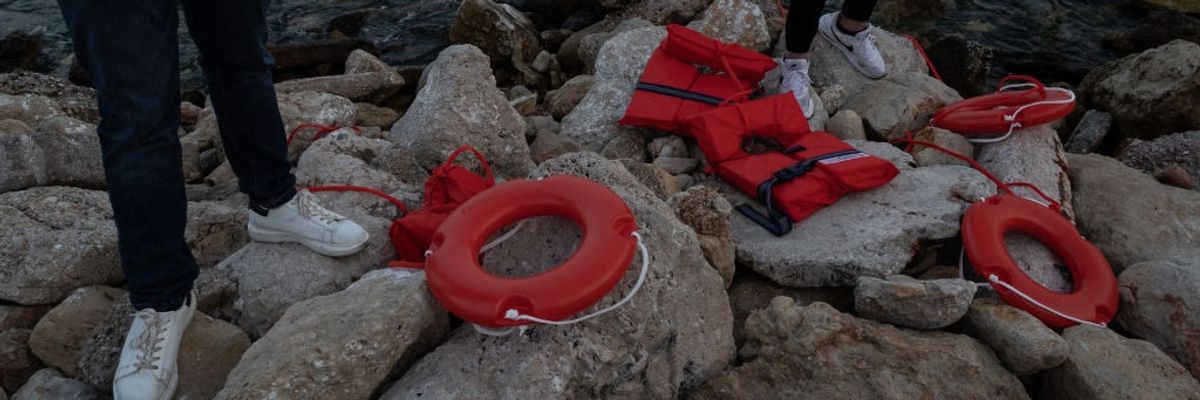Titan and Adriana are two vessels recently lost at sea, four days and 4,000 miles apart. The five men who lost their lives on the Titan have been getting wall-to-wall coverage in the media worldwide. Meanwhile, the estimated 700 who died when the Adriana sank off the coast of Greece, mostly women and children, have been essentially forgotten.
Passengers on the Titan were wealthy; two were billionaires. Each had paid $250,000 for an adventure of a lifetime, a deepsea dive to view the wreckage of the Titanic, the “unsinkable” passenger liner that sank in 1912 after hitting an iceberg. Those crammed onto the ramshackle Adriana fishing boat were seeking not adventure but refuge from war, poverty, climate change, or any of the many other life-threatening crises that force people to flee their homes with little more than the clothes on their back. They paid human traffickers to ferry them from Libya to Europe.
Perhaps the most notable difference between these two disasters was how the world responded to them. Governments immediately spent millions mounting a search and rescue operation to find the Titan, submerged somewhere in the north Atlantic, deep below an area twice the size of Connecticut. Media outlets provided continuous coverage, with one launching a countdown clock predicting when the submersible’s oxygen would run out. The U.S. Coast Guard and Navy and the Canadian government sent planes and boats to the search area. France and Canada each deployed deep sea robots. People around the world watched and waited breathlessly.
The U.N. High Commissioner for Human Rights estimates that close to 1,200 have perished so far this year in dangerous sea crossings to Spain, Italy, and Greece. These deaths, about the same number as died on the Titanic, are surely an undercount.
Meanwhile, in Greece, officials knew the exact location of the overcrowded, disabled Adriana. Shocking details are now emerging of its sinking on June 14. First-hand accounts, reported in El País, suggest the Greek Coast Guard could have saved the doomed vessel’s 400-750 passengers, but opted not to.
El País reported:
“The Greek authorities had been aware of the ship’s presence since 11 am on June 13 and, in addition to keeping it under surveillance, ordered two ships in the area to deliver food and water to those onboard. They never activated a rescue operation, despite the conditions in which the ship was sailing, not even when the ship’s engine broke down at 1:40 am. Between 2:04 am and 2:19 am, the old metal fishing trawler jolted violently and then disappeared right before the eyes of the Greek coastguard. It is still not clear what happened, but the sea swallowed everything up.”
(The Adriana’s sinking at 2:19 am grimly paralleled that of the Titanic, which sank at 2:20 am. Both sank in water over 12,000 feet deep.)
Most or all of Adriana’s roughly 100 survivors were helped not by Greek authorities but by a private yacht that had responded to the distress call. Among the survivors were 47 Syrians, 43 Egyptians, 12 Pakistanis, and two Palestinians. All were men, as they were traveling above deck on the Adriana. Hundreds of women and children were trapped below deck, and went down with the ship.
“I am struck by the alarming level of tolerance to serious human rights violations against refugees, asylum seekers, and migrants that has developed across Europe,” Dunja Mijatović, Council of Europe Commissioner for Human Rights, said on June 19, one day before World Refugee Day. “Reports of human rights violations… are now so frequent that they hardly register in the public consciousness.”
Mijatović continued, “Last week’s shipwreck off the Greek coast is yet another reminder that, despite many warnings, the lives of people at sea remain at risk in the face of insufficient rescue capacity and coordination, a lack of safe and legal routes and solidarity, and the criminalisation of NGOs trying to provide life-saving assistance. Elsewhere in Europe, pushbacks at land and sea borders, violence against refugees and migrants, denial of access to asylum, deprivation of humanitarian assistance, and the harassment of refugee rights defenders, are widely documented.”
The International Migration Organization’s Missing Migrant Project puts the Mediterranean migrant death toll at over 27,000 since 2014. The U.N. High Commissioner for Human Rights estimates that close to 1,200 have perished so far this year in dangerous sea crossings to Spain, Italy, and Greece. These deaths, about the same number as died on the Titanic, are surely an undercount. Just this week, 39 migrants are believed to have drowned attempting to cross from Morocco to Spain’s Canary Islands.
The Titan and the Adriana disasters were very different, but both were preventable. All travelers, whether migrants or millionaires, deserve rescue. The global response to the Titan’s disappearance should be the model for how we respond to migrant vessels in distress. Knowing the names and the plights of those seeking refuge is what makes the world care.

